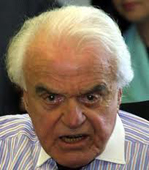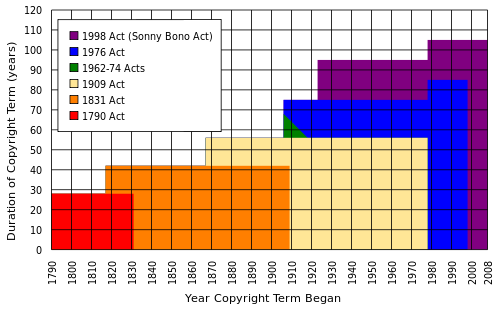Eternal Copyright Returns

Adopted in 1998 in the United States, the law extended the term of copyright for another 20 years. This meant that during these 20 years not a single work will go into the public domain. This is a long time, but it will come to an end. This will happen on January 1, 2019, when works created during the whole of 1923 will have to get out of the control of the copyright holders: an event unseen in America since the 70s.
Known forces led by the MPAA and the RIAA will again attempt to extend copyright. This time it will already be obvious to everyone that the permanent extension of the deadlines is in fact an indefinite, perpetual copyright. Therefore, they decided to convince everyone that it should be so. Until 2019, more than 5 years, but the preparation is already underway. Articles are written, podcasts are made, websites are created that promote the idea that copyright should be eternal.
')
This wave does not reach us yet, but in the USA the activity is quite noticeable. As an example, I will cite here this article, which describes how “the favorite MPAA economist” Stan Libovits talks about his theory of copyright.
Where did the theory of perpetual copyright come from and what is the situation now?
In the English Wikipedia there is an article Perpetual copyright , it contains all the basic data on this issue.
Perpetual Copyright is a term that means either a copyright without a statute of limitations, or a copyright whose term is indefinitely extended. The main philosophical argument used by supporters of the perpetual copyright, suggests that intellectual property rights are similar to the ownership of material objects.

His supporters, such as Jack Valenti (pictured above), argue that intellectual property owners should have the same eternal right to dispose of it and to inherit, which is now used by owners of tangible objects.
The first controversy on this topic arose in the 18th century. When the copyright term set by the statute of Anna began to expire in 1731, London booksellers appealed to the courts to appeal to common law, and a 30-year period began, known as the “battle of booksellers”.
In 1773, when the Hinton case against Donaldson was considered in Scotland, Lord Caymes said that if we accept the perpetual copyright, we will have to allow the eternal right to inherit any result of creative (intellectual) activity. For each phrase, each idea, any non-material entity generated by man, which is obviously absurd, and it has been repeatedly shown in works of art - copyright dystopias .
Fully with the speech of the Lord in the original can be found here. Today, it looks exactly like the typical position of a “pirate” in the copyrighted holivar. With the only difference that the Lord would have been difficult to blame for saying all this, hoping to continue downloading new films and music from torrents for free.
In 1774, a similar case by Donaldson against Beckett reached the House of Lords. Lord Camden spoke most strongly against the concept of "eternity." He warned the Lords that if they vote for a general legal copyright, and in fact for an eternal copyright,
All our knowledge will be locked up, it will be hidden in the hands of Tonsons and Lintots of future times ... Booksellers will be able to set prices as they please until the whole society becomes their slaves as their mercilessly exploited workers ...
As a result, the perpetual copyright doctrine was rejected by the courts of the United Kingdom (the case of Donaldson versus Beckett, 1774) and the USA (the case of Wheaton versus Peters, 1834). In both cases, the courts ruled that copyright is an exclusive right (a form of monopoly ) created by the legislature as an agreement and must have the terms and conditions established by law. In this form, the definition exists to this day. The laws of all countries where copyright exists today establish its term limit.
But ever since (after the Donaldson affair), theoretical controversy about the origin of copyright has continued. Copyright is considered either as the natural right of the author, or as a limited monopoly guaranteed by law. The first theory sees the source of copyright in the creation of work, the second - that such a source exists only thanks to the statute (agreement).
Supporters of the first can be recognized by the phrase "only the author can decide how to manage his work." Nevertheless, even they (at least most of them) believe that perpetual copyright will be detrimental to society, and its time limit is necessary. After all, the recognition of perpetual copyright actually means the abolition of public domain.
In the Public Domain Study Center there is a section dedicated to the problem of the disappearance of the public domain. They portray copyright as an ever-growing egg laying, while the “flying out” public domain of works is getting smaller.

The site has collected a lot of information, articles, books, lectures. For example, they refer to a study on bestsellers of the early 20th century. The 55-page document provides detailed data on the basis of which it is concluded that books that have fallen into the public domain are still being published, their prices are generally lower, and the choice is greater. And this is understandable. What is the point of the copyright holder (monopolist) of republishing some old rare book or music album when they know that there will be very few people willing to buy them and they will not receive much profit? In the conditions of a free market, most likely there would be people willing to release a small circulation.
The forces lobbying for the extension of copyright terms are aware of the positive attitude of society towards its wealth, and therefore they are trying to discredit it in every way. In 1998, Senator Hatch, who supported the extension of copyright terms, spoke of the public domain as “as if it were a bottomless abyss in which all art would disappear, and we will never see or hear again” (quoted from The New York Times). Then they managed to convince the legislators to extend the copyright, and the recent increase in the timing of sound recordings in Europe showed that they still succeed.
Supporters of perpetual copyright are confident that right holders have natural, proof-free eternal intellectual property rights, and the law only hinders them, for some reason limiting this right. They compare the availability of the copyright term with the situation, as if after some years your carpet or chair came to you and claimed that the ownership of it has expired.
However, the reason for the existence of a copyright, and the limitation of its term, is well known. This has already been written many times, but you can repeat it again. This is written in the US Constitution and in the statute of Queen Anne. Monopoly (exclusive rights) was established because it is considered beneficial to society, in order to stimulate creative activity, and ultimately contribute to the progress of science and culture. On the other hand, monopoly is harmful and requires regulation, a compromise.
This compromise should take into account the interests of all parties, including consumers. This is well illustrated by the example of the statute of Anna: the obligation of publishers to provide copies of books to the library and the right of readers to declare an inflated price was stipulated. The full text of the statute is here . Anyone could demand a proceeding, and if it was found that the price of the book was too high or unjustified, the seller was obliged to lower the price to the value set by the person authorized to investigate such matters.
300 years have passed since then and everyone knows the state of the laws today.

Society considers this state unfair. Polls (including a recent survey in Habré ) show that copyright terms are too high. Despite this, attempts to establish perpetual copyright continue, lobbied by the most skilled and influential players in the copyright business. They have enormous financial and legal resources, and they use all this to convince the public that the public domain is harmful, that the copyright must be eternal and that consumers do not have the right to vote on this issue.
It's the most important. Content consumers have the same right to decide what copyright should be like copyright holders. Now the law is being formed not just without taking into account the views of consumers: the interests of authors, society (both economically and culturally) are also not taken into account. This is confirmed by many independent studies conducted in recent years around the world. The only thing that plays a role is the interests of rights holders. Therefore, it is not surprising that copyright has become a swear word. And it is not surprising that the slogan that can be heard today, not only in pirate, but in any other community: “copyrights, burn in hell”!
Source: https://habr.com/ru/post/174453/
All Articles